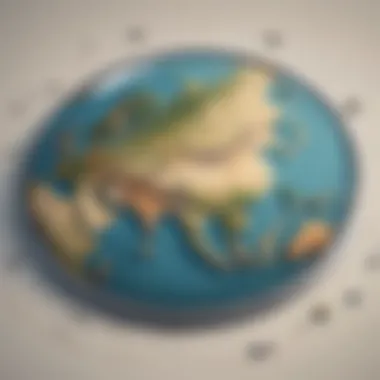Unveiling the Transformational Effects of Globalization in Today's Highly Connected World


Understanding Globalization in Today's Interconnected World
Globalization, in the context of today's interconnected world, refers to the interconnectedness and interdependence of nations through the exchange of goods, services, information, technology, and culture. It transcends traditional boundaries, reshaping economies, societies, and cultures on a global scale. The process of globalization has been significantly accelerated by advancements in technology, communication, and transportation, facilitating increased interconnectedness among individuals, businesses, and nations worldwide.
Impact on Economies
Globalization has had a profound impact on economies worldwide. It has led to the integration of markets, increased trade liberalization, and expansion of multinational corporations, fostering economic growth and resulting in the creation of diverse job opportunities. However, globalization has also been associated with challenges such as income inequality, job displacement due to outsourcing, and vulnerability to economic crises in a globally interconnected market.
Societal Transformations
The societal effects of globalization are far-reaching and multifaceted. Cultural exchange and diversity have been promoted through the global spread of information, ideas, and values. Additionally, globalization has influenced social movements, urbanization trends, and the adoption of Western consumer culture in various parts of the world. While globalization has brought increased access to information and resources, it has also raised concerns about the preservation of local traditions and cultural identities.
Cultural Dynamics
Cultural globalization has led to the fusion and hybridization of traditions, resulting in the emergence of unique cultural expressions. The exchange of languages, cuisines, fashion trends, and popular culture has created a globalized cultural landscape characterized by diversity and interconnection. However, critics argue that cultural homogenization and the dominance of Western cultural norms can threaten the preservation of indigenous cultures and languages.
Technological Advancements
Advancements in technology have played a pivotal role in driving globalization forward. The internet, digital communication platforms, and e-commerce have revolutionized the way individuals and businesses interact globally. Technological innovations have enabled real-time collaboration, instant access to information, and the rapid dissemination of ideas, contributing to the acceleration of globalization processes.
Conclusion
Introduction to Globalization
Globalization, in the context of this expansive discourse, stands as a pivotal force in the intricate web of interconnected societies and economies that define the contemporary world. The paramount significance of comprehending the nuances surrounding globalization stems from its profound influence on diverse realms of human existence, spanning economic, social, and cultural dimensions with far-reaching implications. As we navigate the complexities of the digital era, understanding the genesis and evolution of globalization becomes imperative to grasp the mechanisms underpinning the interconnectedness shaping our global landscape. \n\n Delving into the realm of Introduction to Globalization unlocks a multifaceted tapestry embroidered with intricate threads of commerce, communication, and cultural exchange, elucidating the arteries through which ideas and capital flow across geographical boundaries. By expounding on the core tenets that drive global integration and delineating the structural frameworks that facilitate cross-border interactions, this section paves the way for a profound exploration of globalization's multifaceted impacts. From dissecting trade liberalization to unraveling the dynamics of global supply chains and offshoring, this section highlights the transformative nature of globalization on economies worldwide, shedding light on the intricate web of interdependence that binds nations and markets. \n\nMoreover, delving into the cultural dimensions of globalization unveils a vibrant mosaic reflecting the myriad ways in which diverse traditions, beliefs, and practices intersect and evolve in the ever-expanding global milieu. By examining the shifting paradigms of cultural exchange, diversity, and inclusion, this section navigates the complexities of identity formation amidst the currents of global integration, elucidating the power dynamics embedded within cultural interactions in a hyperconnected world. Through an incisive exploration of the challenges posed to traditional practices by the tide of globalization, this section unravels the intricate interplay between preservation and adaptation, shedding light on the dialectical processes that underpin cultural evolution in a globalized landscape. \n\nIn essence, Introduction to Globalization serves as a gateway to a deeper understanding of the multifaceted impacts of global interconnectedness, setting the stage for a comprehensive exploration of the intricate tapestry woven by the forces of globalization in today's interconnected world.
Historical Perspective
Exploring the Historical Perspective in the context of globalization is crucial in understanding the roots and progression of this global phenomenon. By examining the historical trajectory of globalization, we can grasp the evolution of interconnected economies, societies, and cultures. Unearthing the origins and development of globalization provides invaluable insights into the driving forces behind today's global landscape.
Origins of Globalization


When delving into the Origins of Globalization, we uncover the early seeds that sprouted into the intricate web of interconnectedness we witness today. The Origins of Globalization trace back to ancient times when human civilizations began exchanging goods, ideas, and cultures across vast distances. This gradual interconnection laid the groundwork for the intricate global networks we experience in the present day.
Early Trade Routes
Exploring Early Trade Routes sheds light on the pivotal role commerce played in fostering global connections in history. These trade routes, such as the Silk Road and Spice Route, facilitated the exchange of goods, technologies, and knowledge among distant regions. Early Trade Routes not only catalyzed economic growth but also spurred cultural exchange and technological advancement on a global scale.
Colonialism and Global Expansion
The era of Colonialism and Global Expansion marked a significant chapter in the historical narrative of globalization. Colonial powers ventured into distant lands, establishing trade networks, imposing dominion, and reshaping societies globally. This period of global expansion introduced new goods, labor systems, and power dynamics, leaving a lasting impact on the interconnectedness of the world. Examining Colonialism and Global Expansion unveils the complex interplay between power, economics, and culture that continues to influence the modern global landscape.
Economic Implications
In the realm of globalization, Economic Implications play a pivotal role in shaping the interconnected world we live in today. This section sheds light on the intricate dynamics of international trade, investments, and financial flows that transcend national boundaries. Understanding Economic Implications is essential for comprehending how globalization influences economies worldwide. It encompasses a plethora of factors, ranging from market integration to macroeconomic policies and beyond.
Trade Liberalization
Trade Liberalization stands as a cornerstone of Economic Implications within the scope of globalization. It involves the removal or reduction of barriers to trade between nations, such as tariffs and quotas. This process fosters increased commerce, boosts economic growth, and enhances resource allocation efficiency globally. Trade Liberalization promotes competition, spurs innovation, and enables countries to specialize in producing goods and services where they have a comparative advantage.
Global Supply Chains
Global Supply Chains constitute a fundamental aspect of Economic Implications in the context of globalization. These intricate networks involve the sourcing of raw materials, production, and distribution of goods across different countries. The efficiency of global supply chains impacts cost-effectiveness, production timelines, and overall business performance. With the advent of globalization, companies have leveraged global supply chains to access diverse markets, reduce costs, and respond swiftly to changing consumer demands.
Outsourcing and Offshoring
Outsourcing and Offshoring are significant facets within Economic Implications that have gained prominence in the era of globalization. Companies outsource non-core functions or tasks to external vendors or offshore locations to capitalize on cost savings, access specialized skills, and improve operational efficiency. Offshoring involves setting up operations in foreign countries to benefit from lower labor costs and favorable business environments. While these practices offer various advantages, they also raise concerns related to job displacement, quality control, and ethical considerations.
Technological Advancements
In the intricate web of globalization, technological advancements emerge as a pivotal force propelling interconnectedness across borders. The crux of this article lies in deciphering the transformative impact of technology on reshaping the contemporary global landscape. Innovative technological inputs drive the engine of globalization, unleashing a spectrum of opportunities and challenges that beg exploration.
Digital Revolution
Within the realm of technological progress, the digital revolution stands as a beacon of unprecedented change. This seismic shift towards digitalization has revolutionized how information is accessed, shared, and utilized on a global scale. From the proliferation of smartphones to the ubiquity of high-speed internet, the digital surge has dismantled traditional barriers, catalyzing a new era of connectivity and engagement.


Communication Networks
Delving deeper into the tapestry of globalization, communication networks emerge as the foundational framework fostering seamless interactions across continents. The evolution of communication infrastructures, ranging from fiber-optic cables to satellite networks, has exponentially enhanced the speed and reach of information dissemination. This interconnected web of communication plays a vital role in facilitating real-time collaborations, driving innovation, and bridging cultural divides.
E-Commerce and Online Platforms
Amidst the digital metamorphosis of our world, e-commerce and online platforms emerge as the avant-garde of commercial transactions and social interactions. The surge in e-commerce activities has not only reshaped consumer behaviors but also redefined business models, empowering enterprises to transcend geographical constraints and tap into a borderless marketplace. Online platforms serve as digital agora, where ideas converge, transactions unfold, and communities thrive in the virtual realm.
Cultural Interactions
Cultural Exchange
Cultural exchange serves as a fundamental pillar of globalization, facilitating the sharing of traditions, beliefs, and practices among diverse communities. Through cultural exchange, societies gain a deeper appreciation of each other's heritage, promoting mutual understanding and respect on a global scale. It enables the transmission of ideas and values across borders, enriching cultural landscapes and fostering interconnectedness among nations.
Diversity and Inclusion
Diversity and inclusion are pivotal elements in the realm of globalization, emphasizing the celebration of differences and the integration of varied perspectives. In today's interconnected world, embracing diversity fuels innovation, promotes creativity, and fosters a sense of belonging among individuals from different cultural backgrounds. Cultivating an environment of inclusivity not only enhances social cohesion but also paves the way for progressive societal transformations.
Challenges to Traditional Practices
As globalization continues to bridge geographical boundaries, it poses challenges to traditional practices deeply rooted in culture and heritage. The clash between modernity and tradition creates complexities that necessitate careful navigation. Preserving cultural authenticity amidst the influx of global influences becomes a pressing concern, requiring societies to strike a delicate balance between embracing change and safeguarding their heritage.
Societal Changes
Globalization has ushered in a wave of societal changes that have reshaped the way individuals and communities interact and thrive in the interconnected world of today. These changes are pivotal in understanding the dynamics of globalization and its far-reaching implications on societies worldwide. Societal changes encompass a broad spectrum of transformations, ranging from cultural shifts to economic adaptations, that have a profound impact on the social fabric of nations. One of the critical aspects to consider regarding societal changes is the evolution of norms and practices within different social groups, influenced by external factors propelled by globalization. Understanding these societal changes is crucial for navigating the complexities of the modern world and adapting to the ever-evolving global landscape.
Migration and Urbanization
Within the realm of societal changes, migration and urbanization stand out as significant phenomena that have been magnified by the forces of globalization. Migration, driven by various factors such as economic opportunities, conflict, and cultural exchange, has led to the movement of people across borders at an unprecedented scale. The impact of migration on societies is profound, shaping demographics, cultural diversity, and labor markets. Furthermore, urbanization, fueled by globalization, has accelerated the growth of cities into economic and cultural hubs, presenting both opportunities and challenges for residents and policymakers alike. Understanding the complex interplay between migration, urbanization, and globalization is essential for grasping the intricate social dynamics at play in today's interconnected world.
Social Media Influence


The rise of social media in the era of globalization has revolutionized the way individuals communicate, interact, and consume information. Social media platforms have become powerful tools for connecting people across vast distances, transcending geographical barriers and fostering global conversations. The influence of social media on societal norms, political discourse, and cultural trends cannot be understated, as these platforms shape public opinion and perceptions on a global scale. However, alongside its benefits, social media also raises concerns regarding privacy, misinformation, and digital divide, highlighting the complex and multifaceted nature of its influence in the modern world. Understanding the impact of social media on society is imperative for navigating the challenges and opportunities presented by this digital age.
Health and Environmental Impact
Globalization has brought about significant health and environmental implications that reverberate across borders and continents. The interconnected nature of today's world has led to the spread of diseases, environmental degradation, and health inequalities that transcend national boundaries. From pandemics to climate change, the health and environmental impact of globalization underscores the need for collective action and international cooperation to address these pressing challenges. Understanding the intersection between health, the environment, and globalization is essential for fostering sustainable development and safeguarding the well-being of present and future generations in an increasingly interconnected world.
Political Ramifications
Globalization has brought about significant turmoil in various political domains, affecting international relations, policies, and governance structures worldwide. The intricacies of political ramifications highlight the transformation of traditional power dynamics, emphasizing a shift towards cooperative global governance. The evolution of political systems due to globalization underscores the interdependence of nations and the necessity for effective collaboration in addressing transnational issues. Political ramifications encompass a spectrum of challenges and opportunities, shaping the landscape of diplomatic endeavors and strategic alliances. The intersection of politics and globalization catalyzes debates on national interests versus global responsibilities, reflecting the complex nature of contemporary international affairs.
Global Governance
In the realm of global governance, the impact of globalization manifests in the formation of international frameworks and institutions designed to facilitate cooperation among nations. The concept of global governance underscores the need for cohesive strategies to address global challenges such as climate change, security threats, and economic disparities. Through global governance mechanisms, countries navigate complex issues that transcend national boundaries, seeking common ground on matters of global significance. The proliferation of global governance structures signifies a paradigm shift towards collective decision-making and collaborative action to achieve sustainable peace and development on a global scale.
National Sovereignty
Conversely, the concept of national sovereignty undergoes reevaluation in the context of globalization, as states balance autonomy with interdependence in the international arena. The tension between safeguarding national interests and participating in global initiatives underscores the intricate interplay between sovereignty and globalization. National sovereignty serves as a cornerstone of statehood, encompassing authority, identity, and territorial integrity, yet global dynamics increasingly challenge conventional notions of autonomy. The discourse on national sovereignty in a globalized world emphasizes the need for adaptive governance models that reconcile domestic priorities with external commitments, navigating a complex geopolitical landscape.
Trade Agreements and Alliances
Trade agreements and alliances play a pivotal role in shaping the economic dimensions of globalization, fostering cross-border trade, investment, and cooperation. The negotiation and implementation of trade agreements reflect the interconnected nature of modern economies, promoting economic integration and market liberalization. Through strategic alliances, countries seek to enhance competitiveness, expand market access, and mitigate trade barriers, underlining the significance of economic diplomacy in a globalized context. Trade agreements and alliances stimulate economic growth, facilitate technological exchange, and influence regional dynamics, positioning states within a global network of interdependencies and mutual benefits.
Future Trends in Globalization
Globalization, an ever-evolving phenomenon, constantly adapts to the changing world dynamics. Looking ahead, understanding the future trends in globalization is pivotal in foreseeing how societies, economies, and cultures will continue to interconnect. This section delves into the significance and implications of upcoming trends in globalization, shedding light on the potential shifts and advancements that will shape our interconnected world.
Automation and Artificial Intelligence in Globalization
One of the prominent future trends in globalization lies in the integration of automation and artificial intelligence (AI) into various industries. As automation becomes more sophisticated and prevalent, it transforms traditional modes of production and service delivery, impacting global supply chains and labor markets. Companies worldwide are increasingly embracing AI to streamline processes, enhance efficiency, and gain a competitive edge in the global market. Exploring how automation and AI reshape globalization offers a glimpse into the future landscape of work and commerce on a global scale.
Sustainable Development and Global Trade
Another critical aspect of future globalization trends revolves around sustainable development practices and their influence on global trade. In a world increasingly conscious of environmental issues and social responsibility, the future of globalization is intrinsically linked to sustainability. Businesses are transitioning towards greener operations, promoting eco-friendly products, and adhering to ethical standards to meet evolving consumer demands. Understanding how sustainability intertwines with global trade sheds light on the trajectory of future business practices and international collaboration.
Virtual Collaboration and Global Networks
The future of globalization also embraces virtual collaboration technologies and the expansion of global networks. With advancements in communication tools, remote work capabilities, and digital platforms, geographical boundaries are becoming increasingly irrelevant. Individuals and organizations can now collaborate seamlessly across borders, fostering innovation, knowledge exchange, and cultural understanding. Delving into the implications of virtual collaboration and global networks unveils the potential for unprecedented connectivity and cooperation in a digitally-driven global landscape.
In essence, exploring the future trends in globalization goes beyond predicting outcomes; it necessitates a comprehensive understanding of the transformative forces shaping our interconnected world. From embracing automation and sustainable practices to leveraging virtual collaboration technologies, the evolving landscape of globalization offers unprecedented opportunities and challenges for societies and businesses worldwide.



